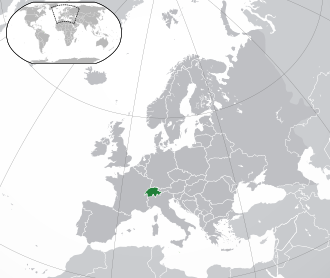Switzerland
File:Swiss Psalm (official instrumental).ogg



Switzerland (German: Schweiz , French: Suisse ,
| Italian language and its dialects | ||||||||||
|---|---|---|---|---|---|---|---|---|---|---|
This Italian language-related article is a stub. You can help WikiMD by expanding it.
|
, Template:Lang-rm) is a landlocked country situated at the confluence of Western, Central, and Southern Europe. It is bordered by Germany to the north, France to the west, Italy to the south, and Austria and Liechtenstein to the east. Switzerland is known for its mountainous terrain, with the Alps covering the southern part of the country and the Jura Mountains in the northwest.
History[edit]
Switzerland's history is marked by its unique position in Europe and its policy of neutrality. The Swiss Confederation was founded in 1291 as a defensive alliance among three cantons. Over the centuries, it expanded to include more regions. Switzerland's neutrality was recognized internationally at the Congress of Vienna in 1815, and it has not been involved in any military conflict since then.
Government and Politics[edit]
Switzerland is a federal republic composed of 26 cantons, each with its own constitution and government. The Swiss political system is characterized by its direct democracy, where citizens have the power to propose and vote on legislation. The Federal Assembly, Switzerland's bicameral parliament, consists of the National Council and the Council of States.
Economy[edit]
Switzerland has a highly developed economy and is one of the wealthiest countries in the world. It is known for its banking sector, pharmaceuticals, and high-quality manufacturing, particularly in watches. The Swiss economy is also supported by a strong service sector, including tourism and insurance.
Culture[edit]
Switzerland is culturally diverse, with four national languages: German, French, Italian, and Romansh. This linguistic diversity is reflected in the country's cultural practices and traditions. Swiss cuisine varies by region, with influences from German, French, and Italian culinary traditions.
Education and Research[edit]
Switzerland is home to some of the world's leading universities and research institutions, such as the Swiss Federal Institute of Technology in Zurich (ETH Zurich) and the University of Geneva. The country invests heavily in research and development, particularly in the fields of science and technology.
Geography[edit]
Switzerland's geography is dominated by the Alps, which cover about 60% of the country's area. The highest peak is Dufourspitze in the Monte Rosa massif. The country also has numerous lakes, the largest of which is Lake Geneva.
Transport[edit]
Switzerland has an extensive and efficient public transportation system, including trains, buses, and trams. The Swiss Federal Railways (SBB) operates the majority of the rail network. The country is also known for its well-maintained road infrastructure and scenic mountain passes.
Also see[edit]
- History of Switzerland
- Geography of Switzerland
- Economy of Switzerland
- Culture of Switzerland
- Politics of Switzerland
|
Ad. Transform your life with W8MD's Budget GLP-1 injections from $75


W8MD offers a medical weight loss program to lose weight in Philadelphia. Our physician-supervised medical weight loss provides:
- Weight loss injections in NYC (generic and brand names):
- Zepbound / Mounjaro, Wegovy / Ozempic, Saxenda
- Most insurances accepted or discounted self-pay rates. We will obtain insurance prior authorizations if needed.
- Generic GLP1 weight loss injections from $75 for the starting dose.
- Also offer prescription weight loss medications including Phentermine, Qsymia, Diethylpropion, Contrave etc.
NYC weight loss doctor appointmentsNYC weight loss doctor appointments
Start your NYC weight loss journey today at our NYC medical weight loss and Philadelphia medical weight loss clinics.
- Call 718-946-5500 to lose weight in NYC or for medical weight loss in Philadelphia 215-676-2334.
- Tags:NYC medical weight loss, Philadelphia lose weight Zepbound NYC, Budget GLP1 weight loss injections, Wegovy Philadelphia, Wegovy NYC, Philadelphia medical weight loss, Brookly weight loss and Wegovy NYC
|
WikiMD's Wellness Encyclopedia |
| Let Food Be Thy Medicine Medicine Thy Food - Hippocrates |
Medical Disclaimer: WikiMD is not a substitute for professional medical advice. The information on WikiMD is provided as an information resource only, may be incorrect, outdated or misleading, and is not to be used or relied on for any diagnostic or treatment purposes. Please consult your health care provider before making any healthcare decisions or for guidance about a specific medical condition. WikiMD expressly disclaims responsibility, and shall have no liability, for any damages, loss, injury, or liability whatsoever suffered as a result of your reliance on the information contained in this site. By visiting this site you agree to the foregoing terms and conditions, which may from time to time be changed or supplemented by WikiMD. If you do not agree to the foregoing terms and conditions, you should not enter or use this site. See full disclaimer.
Credits:Most images are courtesy of Wikimedia commons, and templates, categories Wikipedia, licensed under CC BY SA or similar.
Translate this page: - East Asian
中文,
日本,
한국어,
South Asian
हिन्दी,
தமிழ்,
తెలుగు,
Urdu,
ಕನ್ನಡ,
Southeast Asian
Indonesian,
Vietnamese,
Thai,
မြန်မာဘာသာ,
বাংলা
European
español,
Deutsch,
français,
Greek,
português do Brasil,
polski,
română,
русский,
Nederlands,
norsk,
svenska,
suomi,
Italian
Middle Eastern & African
عربى,
Turkish,
Persian,
Hebrew,
Afrikaans,
isiZulu,
Kiswahili,
Other
Bulgarian,
Hungarian,
Czech,
Swedish,
മലയാളം,
मराठी,
ਪੰਜਾਬੀ,
ગુજરાતી,
Portuguese,
Ukrainian